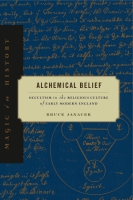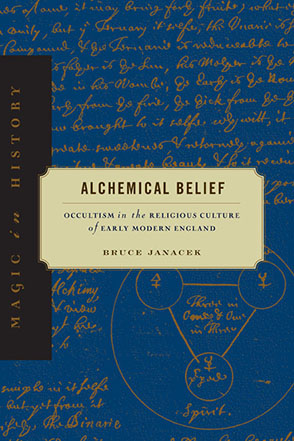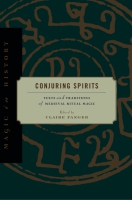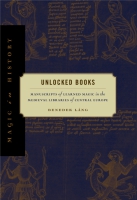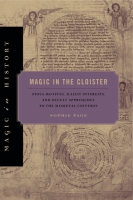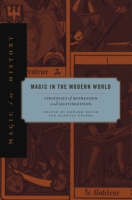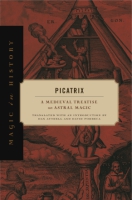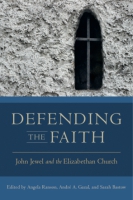Alchemical Belief
Occultism in the Religious Culture of Early Modern England
Bruce Janacek
“Alchemists pursued the secrets of creation, and Alchemical Belief takes their aspirations seriously. With careful readings and well-chosen cases, Bruce Janacek demonstrates that alchemical writings need to be read in the context of their authors’ broader intellectual and devotional pursuits. Alchemical writings lent themselves to the expression of irenic, unifying aspirations for Christianity and provided solutions to the political and religious conflicts rending the early modern world. This argument is as refreshing as it is ambitious.”
- Description
- Reviews
- Bio
- Table of Contents
- Sample Chapters
- Subjects
“Alchemists pursued the secrets of creation, and Alchemical Belief takes their aspirations seriously. With careful readings and well-chosen cases, Bruce Janacek demonstrates that alchemical writings need to be read in the context of their authors’ broader intellectual and devotional pursuits. Alchemical writings lent themselves to the expression of irenic, unifying aspirations for Christianity and provided solutions to the political and religious conflicts rending the early modern world. This argument is as refreshing as it is ambitious.”
“The essence of Janacek’s inquiry around the meaning of belief in alchemy in early modern England both stimulates and challenges the reader. . . . By identifying alchemical belief as an intangible but pervasive force at work within late Tudor and Stuart society, Janacek’s volume is significant for pointing to a more nuanced view of political, philosophical, and religious preconceptions in early modern England. By drawing attention to hidden currents within alchemical culture as an agent of change, Alchemical Belief constitutes an important springboard for new studies about the interrelationship between theology and science in pre-modern society.”
“With the arguments of Bacon in mind, the reader of Janacek’s book can attain a rounded view of early modern alchemical interest in England, which ranged from the wholehearted support of Dee and Fludd to the cautious approval of Digby or the arm’s length attitude of Bacon. This complex view helps to highlight the fact that the eventual triumph of the sceptical views of alchemy was by no means obvious in the climate of early modern England. Indeed, [Alchemical Belief] enlightens the reader by capturing an unfamiliar moment in history, when alchemy offered strong promise for the future.”
“What emerges from Janacek’s treatment of his sources is carefully drawn representation of the many ways in which alchemy provided a language and a method for understanding and ultimately restoring order in a profoundly disordered world. This study demonstrates how the study of learned occultism provides a profitable means for lifting the veil on a critical but complex period in early modern history.”
Bruce Janacek is Associate Professor of History at North Central College.
Contents
List of Illustrations
Acknowledgments
Introduction
1 Thomas Tymme and Natural Philosophy: Schism and Alchemical Unity in the Book of Nature
2 Robert Fludd, Natural Theology, and the Alchemical Debate of 1623
3 Francis Bacon, Alchemy, and the Great Redemption
4 Catholic Natural Philosophy: Alchemy and the Revivification of Sir Kenelm Digby
5 Elias Ashmole: The Collection and Culmination of Alchemical Thought
Epilogue
Notes
Bibliography
Index
Introduction
In 1652 the antiquary, heraldist, and occult enthusiast Elias Ashmole (1617–1692) published his Theatrum Chemicum Britannicum, a massive collection of texts that reproduced manuscript alchemical recipes and treatises in print for the first time. The Theatrum provided seventeenth-century readers with thirty complete alchemical texts and more than twenty alchemical fragments. This collection was not merely a compilation of widely forgotten and nearly lost texts. Ashmole, an antiquary as well as an alchemist, meticulously edited and annotated the volume, providing a discussion of the provenance of each text and explaining, as he understood it, the alchemical tradition itself.1
In the commentary that appeared at the end of his book, titled “Annotations,” Ashmole said that ancient philosophers often “Adopted one other for their Sonns” so that their secret knowledge could be protected and sustained, after their deaths, by heirs worthy of it.2 He wrote of this tradition from personal experience. On April 3, 1651, just a year before he published his Theatrum, the alchemist William Backhouse asked Ashmole to be his son and to call him “father.” At that moment, Backhouse became his adopted “alchemical father.”3 A laying on of hands had occurred, and Ashmole was now part of a line of adepts that stretched from his day to antiquity.4 This “adoption,” however, was more than a mere symbol of a new spiritual bond between master and apprentice; Ashmole believed that it was akin to the ordination of a novice by a priest. With what both men believed to be divine blessing, Backhouse gave Ashmole the power to cleanse and purify the universe. It was a conversion from laity to clergy, but in a way that went beyond his belonging to the Church of England. Ashmole and his circle perceived their alchemical pursuits as pious works that complemented but also transcended the boundaries of the official confession of the Church of England. Ashmole’s private “adoption” by Backhouse legitimized his search for the philosophers’ stone and its vast, universal implications. Immediately afterward, he composed an ode to Backhouse that expressed his profound appreciation of the alchemical significance of his adoption.5
Ashmole drew deliberate parallels between his alchemical heritage, the biblical prophets, and the life of Jesus. “Our English Philosophers Generally, (like Prophets),” he wrote, “have received little honour in their owne Countrey.”6 Although clearly one purpose of his work was to bring England’s rich alchemical tradition to the public’s attention, his comparison of English philosophers to prophets was neither casual nor accidental. In this allusion to the Nazarenes’ rejection of Jesus, their native son, Ashmole elevated natural philosophers to the level of the biblical prophets and, in this instance, of Christ himself. Just as prophets could see and reveal what others could not, he seemed to believe that alchemists were blessed with a singular, divine illumination. Later, he made an even bolder statement about the religious stature of an alchemist when he described a magus as “a Contemplator of Heavenly and divine Sciences, a studious Observer, an expounder of Divine things, a name (saith Marcellus Ficinus) gratious in the Gospell, not signifying a Witch or a Conjurer, but a wise man and a Priest.”7 Ashmole was not merely using metaphorical language. He believed that this was the most appropriate description of practitioners of alchemy. He believed that God had chosen alchemists to be intercessors between the natural world and the divine, and it was fitting that their work be cloaked in the language of the clergy.
Ashmole was far from the only alchemist to invoke such rhetoric in alchemical studies. Robert Bostocke’s text The difference betwene the auncient Phisicke, first taught by the godly forefathers . . . and the latter Phisicke proceeding from Idolaters (1585) had a preface that Bostocke titled “The Authors obtestation to almightie God.” “Obtestation” is a word rarely used today, but it suggests a beseeching by a sacred name, a solemn entreaty or supplication. In other words, Bostocke’s preface to this alchemical text was a prayer.
Bostocke pleaded for God to bless his work so that the heathen work of Aristotle would be discarded and replaced by a new philosophy of nature that accorded more explicitly and perfectly with traditional Christian dogma, such as the belief that matter did not exist until God created it, or that divinity was rightly understood only when expressed in the form of the Trinity. Like most of his contemporaries, Bostocke believed that the sin of Adam and Eve affected the entire natural world: “And for mans transgression all things were made mortall, that is to saie, were by God appointed unto miserie and destruction: so that now the world is become a creature subject to vanitie.”8 Vanity, of course, was the sin that Adam and Eve committed, and therefore their progeny were condemned to this sin. The natural world was as much in need of redemption as they were. Bostocke’s response to this dilemma was to write an alchemical treatise.
Ashmole’s, Bostocke’s, and their brethren’s interest in alchemy becomes clearer when we appreciate that Protestant reformers understood the fall from grace as affecting not only humanity but nature itself. Animals that had been docile companions to humans became wild, the soil became unyielding, and mountains and valleys appeared in place of fertile plains. Before the Fall, Adam had ruled with knowledge and wisdom, but he forfeited that knowledge when he sinned, and thus the forces of nature became mysterious. As Peter Harrison explains, “knowledge of nature required not only a recognition of the cognitive limits of fallen minds, but of the corruption and epistemological inaccessibility of nature and its operations.”9 Alchemists of the sixteenth and early seventeenth centuries believed that the philosophers’ stone would redeem “corrupted” matter and therefore possibly—hopefully—transform and restore the entire natural world to its pristine prelapsarian state, when humanity and nature were in perfect harmony.10 The purpose of this study is to examine the historical significance of these beliefs at their apogee.
Alchemical Belief examines how alchemy in late Tudor and early Stuart England became integrated into central tenets of Christianity. While the individuals under consideration here had their own particular beliefs in the possibilities and potential of alchemy, adepts in early modern England believed that they were uniquely, even divinely, ordained to re-create the harmony that existed between humanity and nature before the Fall. As the Hebrew prophet Malachi made clear, God’s messenger would come, “and he shall sit as a refiner and purifier of silver: and he shall purify the sons of Levi, and purge them as gold and silver, that they may offer unto the Lord an offering in righteousness. Then shall the offering of Judah and Jerusalem be pleasant unto the Lord, as in the days of old, and as in former years” (Mal. 3:3–4). Some English alchemists believed that they were such godly messengers. Alchemical Belief attempts to understand these theological and occult beliefs that early moderns embraced, to understand and explain their religious and political culture.
Although the individuals we will encounter were engaged in restoring England from its fallen state, they were part of a larger effort led by individuals in England and on the Continent who also wanted to diminish the differences between the various Protestant confessions. Early efforts at irenicism probably began no later than the late sixteenth-century Austrian court in Vienna and were followed in the seventeenth century by the so-called Hartlib Circle of Samuel Hartlib, John Dury, and Johann Comenius.11 These amorphous but influential movements shared many of the goals of the alchemists examined in this book. They and others who resided in such far-flung places as Herborn and Prague agreed that their world was sorely in need of restoration and that they were the ones endowed, perhaps even divinely ordained, to restore it.12
An interest in alchemy and the occult typified these movements and defined this effort in England. What’s more, the individuals who wrestled with alchemical concepts came from educated, even elite levels of society. The case studies in this volume collectively argue that some of the most prominent public figures in traditional Tudor-Stuart politics turned to the occult tradition of alchemy to define and defend orthodox Christian beliefs and practices. Like Roman Catholicism, the major Protestant confessions upheld the doctrines of the Trinity, the resurrection of the dead and the redemption of God’s creatures, and the active and living presence of God on earth, and their adherents believed in the importance of approaching all Christian work with humility and reverence. Certain individuals turned to the occult practice of alchemy to demonstrate the veracity of these orthodox beliefs, using unorthodox proofs for orthodox beliefs.13
Thomas Tymme (d. 1620), Robert Fludd (1574–1637), Sir Francis Bacon (1561–1626), Sir Kenelm Digby (1603–1665), and Elias Ashmole developed and articulated their alchemical theories from the 1580s to the 1660s, the decades that led up to the Civil War, the war itself, and its immediate aftermath. These alchemists were not part of the radical groups who wanted to transform the English kingdom along utopian lines.14 The alchemists we will encounter were loyal supporters and, when it came to the Civil War, defenders of the Crown; they were, in effect, “Royalist alchemists.” All but one were members of the Church of England, and the one exception, Sir Kenelm Digby, a Roman Catholic, nevertheless moved in the inner circles of power with such deftness and aplomb that he was intimate with both the early Stuart court and the Cromwellian Protectorate. That the practice of alchemy could serve the orthodox positions of the Church of England suggests that occultism permeated virtually every aspect of early modern English society, including its governing and ecclesiastical structures. These alchemists developed and articulated their alchemical beliefs in the crucible of England’s most unstable and, at certain moments, revolutionary century. While they certainly sought the philosophers’ stone with zeal, their search for religious and political stability was even more ardent.
In his classic study The Problem of Unbelief, Lucien Febvre asked whether it was possible to be an atheist in the sixteenth century. Through his historical and literary examination of Rabelais, Febvre argued that “atheist” was an epithet hurled at someone who criticized authority or had unconventional opinions.15 Febvre used the work of Rabelais as the window through which he viewed the values, suppositions, and preconceptions of sixteenth-century society.
If Rabelais served Febvre well to examine atheism in the sixteenth century, alchemy may serve as a similar window with which to view early modern English religious culture. Jonathan Scott has urged historians of seventeenth-century England to take contemporary belief seriously in order to understand the political and religious causes of instability during that century. He asks us to listen very carefully to seventeenth-century voices of fear and concern, because they led to the political collapse and ensuing devastation of civil war and regicide.16 This study echoes that sentiment and suggests that we should listen not only to the concerns and fears of these alchemists but also to their hopes—hopes that might seem very strange and alien to us but that may reveal a great deal about what the French so elegantly call mentalités, or collective attitudes.17
Indeed, it is precisely because the hope they placed in the alchemical process seems so odd to us that we should consider it closely. As Robert Darnton, Natalie Zemon Davis, and other historians of early modern European culture have argued, historical episodes or issues that are foreign to us are the episodes and issues we should study most carefully. Comprehending the oddities of the past helps us to grasp historical culture more fully and helps us steer clear of anachronistic interpretations and conclusions.18 An understanding of the role of alchemy in the theological and philosophical debates of the day can clarify how seventeenth-century thinkers believed knowledge would be revealed to them, and the goals that this knowledge would help them attain.
The concept of religious or spiritual belief itself, however, is slippery and elusive. As sophisticated studies of alchemy by historians of science have shown, belief played little or no part in the work of some alchemists. These alchemists left contracts and notebooks that document days, months, even years of hard work in search of tangible results for the alchemist and patron, but reveal little or no preoccupation with what we could call religious belief.19
But there were also early modern alchemists whose alchemical and religious beliefs came together with breathtaking results. These alchemists used alchemy to illustrate, demonstrate, and, in their minds, even prove theological doctrines such as the Trinity and the resurrection of the dead. What better way to gain a deeper understanding of early modern English mentalités than to look into the contemporary understanding of alchemy?
The social and political instability, and the political and cultural revolutions, of the seventeenth century affected virtually all dimensions of society: politics, religion, diplomacy, military decisions, and philosophical inquiries into the natural world. Nearly all of these tensions and instabilities arose from deeply held beliefs woven into the fabric of early modern society and culture. The resurgence of the skeptical philosophy called into question every assumption about the universe, including the actions and even the presence of God. The mechanical philosophy threatened to unseat Aristotelianism, the preeminent philosophy for two thousand years. Biblical scholarship began to reveal the patchwork quality of a sacred text that until then was thought to be seamless. Although he used the term to refer specifically to the politics of the English Revolution, Christopher Hill could have been referring to virtually all of European society when he described the first half of the seventeenth century as a “world turned upside down.”
England was as unsettled and unstable as any region in Europe. When Elizabeth I ascended to the throne in 1558 following the death of her half sister, Mary I (1553–58), she inherited a realm that had endured decades of religious and political tension and occasional bloodshed. Henry VIII’s initial break with Rome, Edward VI’s embrace of genuine Protestant doctrines, and Mary I’s reactionary response, which brought England back into the Catholic fold, however briefly, bequeathed to Elizabeth a traumatized and dispirited religious culture. Elizabeth I (1558–1603) deftly sidestepped this turmoil by passing through Parliament what became known as the Elizabethan Settlement (1559). This statute, along with the so-called Thirty-Eight (eventually Thirty-Nine) Articles of 1563, codified the Protestant doctrine of predestinarian grace within a liturgy that preserved some outward aspects of Roman Catholic worship, creating a church that looked something like the old but spoke in the new language of the Protestant theology of grace. Such would be Elizabeth’s Church of England, accommodating and inclusive, but also reminiscent of a monarch who believed that her role in the faith of her subjects was and should be substantial.
Such a church could work for many English believers, but not for all. One faith community particularly riled by Elizabeth’s Church of England was a Calvinist sect that referred to itself as “the gathered church,” after the way they gathered in the homes and barns of fellow believers, dispensing with the “Romish” fondness for stained glass, altars, and, most annoying of all, the Book of Common Prayer, the liturgical content of which, in Calvinist eyes, bore a suspiciously close resemblance to the old Catholic liturgy. Such direction from on high spoke menacingly to the godly, who rejected any mediation whatsoever between themselves and the word of God. This attitude struck outsiders as sanctimonious, and it was not long before they were mocked for their “purity” and became known, derisively, as “Puritans.” Sanctimonious they may have been, but Puritans were also increasingly vocal in their complaints and often politically and financially influential in their communities.20
Tensions between congregants of the Church of England—who eventually became known as Anglicans—and Puritans led to a series of civil wars in the 1640s.21 These wars were fought between Parliamentarians—whose ranks were drawn from Puritans and Presbyterians (another Calvinist factional group, this one born in Scotland)—and Royalists, who garnered their forces largely from Anglicans loyal to Charles I. The causes of these wars are still a source of controversy, mainly in terms of emphasis.22 Certainly economic issues, social tensions, and questions of political liberties contributed to the outbreak of hostilities. However, there is fairly widespread agreement that religion was a central cause, particularly religious disagreement between a defiant and uncompromising Puritan minority and the Church of England, which aspired to accommodate a breadth of believers, broad enough, as we will see, to include those who studied and practiced alchemy. The Puritans’ intransigent radicalism exasperated Anglicans to no end, and led eventually to civil war.
The debate on the religious causes of the English Civil War has centered on disagreement over the question of divine grace, a deeply serious issue in the early modern period. Calvinists, Puritans, and Presbyterians all believed that God’s grace predestined individual fate, that an individual was saved or damned solely at God’s discretion. This belief differed profoundly from the Roman Catholic view that individuals had the freedom to make choices pleasing to God and to earn God’s grace through their piety and good works. Such a theology presumed and encouraged a central role for formal ecclesiastical experience in assisting individuals in making the best choices. In the late sixteenth century, however, the Dutch reformer Jacob Arminius (1560–1609) gained a following by arguing for a Protestant understanding of grace obtained through the exercise of free will; Arminius denied the strict predestination of the Calvinists—the doctrine that only the elect could be saved—and held out the possibility of salvation for all. Because Arminians attended to formal liturgy and worship, and cared about such things as repairing damaged stained-glass windows and altars, they found themselves vulnerable to accusations of “popery.”23 Although the influence of Arminianism has probably been overstated as a cause of the hostilities, it was undoubtedly a divisive force in an era that could ill afford it.24
Alchemical Belief opens the doors of this debate a bit wider, beyond the questions of grace, predestination, and free will, by looking at the personal spiritual journeys of a handful of individual members of the Church of England, journeys that led these individuals to defend Anglican orthodoxy through novel and unorthodox means. Individuals we will encounter upheld the traditional tenets and theology of the Church of England, and of Christianity more broadly, yet they saw themselves as more than simply stewards of the church. They pursued their alchemical inquiries not only as fully vested members of the Church of England but as a matter of profound theological responsibility. Their understanding of that responsibility demonstrates the breadth of belief possible within the Church of England at a relatively early moment in its history.
Whatever the causes, the divide between increasingly radical Puritan/Parliamentary forces and Royalists of the established church led to enormous bloodshed. In the historical debate over the labyrinthine political and religious conflicts of the day, the vast scale of the casualties suffered in the 1640s is sometimes overlooked or even forgotten. While it is impossible to know the exact number of casualties, the rough consensus of 190,000 English killed amounts to 3.7 percent of the total population of England, a significantly greater percentage than the 2.6 percent of English killed in World War I and the 0.6 percent lost in World War II.25 As devastating as these numbers were for the English, the Scots suffered an even greater loss of 6 percent of their population.
However, the English Civil War was fought between different confessions of Protestantism. The level of devastation soared exponentially when Protestants fought Catholics during the Thirty Years’ War. When Protestant England invaded and conquered Catholic Ireland in the 1650s, between outbreaks of plague, famine caused by disruption of the agricultural season, and the battles themselves, the Irish lost an astounding 41 percent of their population, a level of devastation that may more appropriately be thought of in terms of genocide or holocaust than of conquest.26
The elusive nature of religious and political stability in England in these decades coexisted with the early modern English belief that the universe was suffused with God’s divine presence, beginning most notably with the monarch. English monarchs saw themselves and their right to rule as divinely ordained. While this was certainly true of Elizabeth, no English monarchs had greater confidence in their divine right than the early Stuart kings, James VI and I (1603–25) and his son, Charles I (1625–49). James, the author of The Trew Law of Free Monarchies (1598), codified the belief, held by generations of political theorists, that the monarch was God’s divine representative on earth. Scripture put the lie to any who might quarrel with this potent theory of kingship.27 It was thus eminently appropriate for all to bow before the king, who bowed only to God. As God’s representative, the monarch was addressed as “liege lord,” “Majesty,” “Highness” and even “dread sovereign,” and although these titles surely carried a sense of convention, they also carried the awesome and awe-inspiring source of the monarch’s power and authority.28
Yet, as Conrad Russell reminds us, early moderns did not believe that God’s divine presence on earth ended so much as it began with the monarch. Russell observes that there was “the divine right of the law, the divine right of Parliaments, the divine right of prophets, the divine right of judges, Justices of the Peace, and inferior magistrates, the divine right of the nobility, and the divine right of husbands, fathers, and masters.” “What determined people’s views on the extent of the king’s power,” he notes, “was not whether they believed in this divine right, but their views, often shaded and obscure, on the relationship between his divine right and other divine rights.”29 Divine right was a concept that suffused early modern English society from top to bottom.
Indeed, belief in the sacred nature of the monarch led thousands of English, both commoners and nobility, to seek “the royal touch.” Beginning with the eleventh-century monarch Edward the Confessor (ca. 1003–1066) and continuing through the Hanoverian dynasty in the eighteenth century, the English believed that their monarch’s touch alone could cure them of epilepsy and a condition known as scrofula, a chronic enlargement and degeneration of the lymphatic glands, known as “the king’s evil.” That certain elect humans could be God’s conduit to his earthly creatures was a common belief among early moderns. When alchemists worked at their furnaces or wrote their philosophical treatises, they reflected widely held assumptions about how the universe operated under God’s divine guidance, and how it could be manipulated by those elect few.
But people in early modern Europe believed that all kinds of forces—both divine and demonic—were at work in their world. For the years in which alchemists were engaged in their work were the same years that witch hunts engulfed much of western Europe and Britain. A few naysayers and skeptics notwithstanding, early moderns, notably the intellectual elite, clerics, justices, and lawyers, believed that the devil stalked and seduced those most likely to fall under his spell (old women, primarily, but others too), in an effort to reclaim what he believed was rightfully his, the earthly world.30 Although the estimates of accusations, prosecutions, and executions are diminishing in light of new research, the scale of this hysteria is still difficult for us to comprehend fully. From roughly 1480 to 1680, the period identified as the peak of the witch hunts, nearly ninety thousand individuals, mostly women, were prosecuted for witchcraft, and approximately half of them were executed.31 Every prosecution and execution was driven by fiercely held beliefs. While England did not experience this hysteria as deeply or as broadly as other regions, such as Scotland or southwestern Germany, accusations of witchcraft and trials of alleged witches surged in England in the first half of the seventeenth century, particularly during the Civil War.32 The hopeful beliefs that alchemists brought to their work coexisted with beliefs that embodied the fears and dread of the era.
There is no question that fiercely held political and religious beliefs were a central cause in the outbreak of civil war in England. As Jonathan Scott reminds us, “If, therefore, ‘seventeenth-century men killed, tortured and executed each other for political beliefs,’ that was because belief lay at the heart of the troubles.”33 As with the inquisitors and prosecutors of the witch hunts, the beliefs that explained and justified the actions of Cavaliers and Parliamentarians resulted in terrible devastation. The anxiety and fear generated by the ensuing cataclysm, and its dreadful fulfillment in the staggering loss of life, were certainly one reason why alchemists believed their work was so important. No wonder the quest for the philosophers’ stone was pursued so fervently.34
Nevertheless, despite the sincerity of alchemists, belief in the efficacy of alchemy was controversial even in the seventeenth century. To believe in alchemy meant that an individual had to reconcile alchemical principles with some of the most significant and influential ideas, institutions, and beliefs of the day. Calvinism, Catholicism, skepticism, Baconian method, the mechanical philosophy, collecting, and antiquarianism all dealt at times with the religious and philosophical implications of alchemy. Belief in alchemy demanded that one consider questions of predestination and free will, a profoundly divisive intellectual issue. At least two points may be made at the outset: First, the widespread interest in alchemy should not be construed to mean that it enjoyed universal acceptance. Second, underlying the practice of alchemy was an inherent belief in the viability of alchemical work. It is the story of the viability of alchemical beliefs that this study aims to tell.
Belief in the theological relevance of alchemical work did not mean that all alchemists subscribed to such grand goals and ambitions. Recent scholarship on early modern alchemy has revealed a vast range of alchemists engaged in the practice for very different, sometimes very personal, reasons, some of which had little or nothing to do with the redemptive qualities and purposes of alchemy that the alchemists we will encounter held.35
Invigorated by alchemy’s theological and philosophical potential, however, some English alchemists hoped that alchemy could help to address their kingdom’s particular crises. Seventeenth-century adepts drew deep, often personal, correlations between the alchemical processes of corruption and purification and their work as they wrestled with the conflict between knowledge and belief that characterized early modern English society. At a time when England was suffering the greatest divisions in its history, these individuals hoped that alchemy might act as a sacred balm for its political and religious crises.
Even now we can see how belief permeated virtually every aspect of society. Alchemical Belief purports to examine many manifestations of belief in sixteenth- and seventeenth-century England. The beliefs we will encounter will usually be a Christian doctrine, such as the Trinity. However, the alchemists we encounter believed in more than orthodox Christian doctrines. They believed that the alchemical process could demonstrate the veracity of those orthodox beliefs; belief, therefore, was as essential to their work as mercury and the fire in their furnaces.
The subject of alchemy has received generous and sophisticated attention in modern historical scholarship, beginning with the pioneering work of Allen Debus, who began in the 1960s to document the influence of Paracelsianism in early modern science and medicine.36 R. J. W. Evans identified the important role of alchemy in Rudolf II’s mysterious court culture. Bruce Moran has contributed two important volumes to this discussion; the first considers alchemy within the post-Reformation world of the court of Hessen-Kassel and establishes the breadth of alchemical belief in early seventeenth-century Germany. His second volume examines the German natural philosopher Andreas Libavius and places his often polemical writings on logic, education, and rhetoric, as well as what he calls Libavius’s “chymia” writings, within their intellectual, social, and cultural context. Pamela Smith examines the role of alchemy in the evolving commercial economy of the Holy Roman Empire in the second half of the seventeenth century.37
The practice of alchemy in England during the early modern period has also received a great deal of scholarly attention. In three monographs and numerous articles, B. J. T. Dobbs identified and clarified the role of alchemy in the work of one of the towering figures of the scientific revolution, Sir Isaac Newton.38 William Newman has traced the influence of one of the most elusive alchemists of the seventeenth century, George Starkey, who wrote his alchemical treatises under the pseudonym Eiraneus Philalethes. Newman has also written a much broader study of alchemy, considering the issue within the context of the debate over art and nature. Lawrence Principe has argued that alchemy was a more significant factor in natural philosophy and the religious belief of Robert Boyle than historians have recognized.39 Through her study of the Elizabethan physician Simon Forman, Lauren Kassell has provided us with a deeper understanding of the medical community of his day and the ways in which alchemy was a significant component of contemporary medical practice.40 The present study is deeply indebted to this scholarship, which has uncovered a breathtaking sophistication in the work of some of these seventeenth-century adepts. Yet merely locating the alchemical tradition in the context of early modern natural philosophy does not explain why some alchemists pursued the philosophers’ stone with such religious zeal.
The interest in and practice of alchemy is a historical development that will yield different answers depending on the questions we pose, as literary scholars have long recognized. Lyndy Abraham has demonstrated how alchemy saturated the poetry of Andrew Marvell, while Stanton Linden has surveyed the remarkable presence of alchemy in English literature from Chaucer to the Restoration.41 Finally, Robert M. Schuler has made available in a modern edition alchemical poetry that had been confined to manuscript, thereby providing a wider audience with a better understanding of scientific poetry in the sixteenth and seventeenth centuries.42
The breadth of alchemy in early modern culture is evident in two major recent studies. Neil Kamil’s Fortress of the Soul is a monumental tour de force that breaks new ground in the question of how alchemical thought and the occult can be understood historically. In his study of Huguenot culture in the Sangois, Kamil demonstrates how Calvinist belief, alchemical studies, and artistic craft were deeply intertwined. He retraces the steps of secretive Huguenot alchemists and craftsmen, following them from their hiding places in La Rochelle to their eventual emigration to the New World.43 Kamil demonstrates that the study of alchemy reveals aspects of early modern culture that lie beyond issues related to the rise of science.
Tara Nummedal has also identified a crucial role of alchemy in early modern society that goes beyond the confines of the scientific revolution. In Alchemy and Authority in the Holy Roman Empire, she examines the alchemical tradition using the previously untapped sources of court proceedings, legal contracts, literary satires, assaying houses, and paintings that provide an unprecedented portrait of the life and work of alchemists in the Holy Roman Empire. Nummedal’s study examines the complex matrix in which alchemists sought to establish and defend their legitimacy when it was threatened by Betrüger, or fraudulent alchemists—even when the accusation of fraud itself was contested.44 This groundbreaking study embraces the complexity of the intellectual, cultural, and social milieu in which early modern alchemists worked.
Alchemical Belief is not a history of science, still less a history of alchemy. As the title makes clear, this volume is a history of belief.45 It is not concerned with the specific practices of alchemy or the degree to which they contributed to the scientific revolution. The case studies that follow examine the religious and philosophical significance that alchemists attributed to their work within the political and religious contexts of their day. As much as possible, these case studies place the alchemical writings of the adepts within the context of their entire oeuvre. The goal of this study is to achieve a more nuanced appreciation of the religious culture of early modern English society. In short, these case studies attempt to explain why an individual might believe in alchemy in early modern England.
The historiography on alchemy has, unsurprisingly, exposed differences in approach and emphasis. In recent studies, William Newman and Lawrence Principe have established themselves as the preeminent historians of alchemy in England. In Alchemy Tried in the Fire, they examine the notebooks of George Starkey and Robert Boyle and argue that their alchemical work was rigorous and methodical and can stand up to any work of natural philosophy in the second half of the seventeenth century. In a startling departure from the passive quality of virtually all historical studies, they reenact the experimental work that Starkey and Boyle conducted, demonstrating not just historically but empirically, in a modern laboratory, the actual reliability and predictable methodology of Starkey’s and Boyle’s alchemical work. Their bracing approach provides a model for future scholars of alchemy in the history of science.
Newman and Principe have also written a powerful account of how spirituality crept into the study of alchemy, and their critique of this trend deserves serious attention. Surely their critique of the laudatory work of Margaret Atwood and Ethan Allen Hitchcock in the nineteenth century, and of Arthur Edward Waite in the twentieth, is valid. Equally valid and convincing is their argument that the Jungian approach to the study of alchemy has produced anachronistic conclusions.46
Some of their other criticisms are more problematic.47 They suggest that the religious imagery employed by early modern alchemists functioned “as a source of tropes and imagery for rhetorical embellishment or didactic exemplification rather than as an inherently spiritual exercise which elevates the practitioner by some esoteric illumination.”48 This observation does not appreciate that virtually all early modern acts of piety and devotion were intended to elevate “the practitioner by some esoteric illumination.” Esotericism, though, was hardly a requirement. Piety and devotion could arise from the most mundane acts. Across the broad spectrum of Christian practice in late sixteenth- and early seventeenth-century England—whether listening to the ubiquitous antipopery sermons, praying, reading, and following the strict discipline of the thousands of devotionals, or even repairing altar rails and sprucing up sanctuaries after decades of neglect—the goal of pious work and devotion was to narrow the gap between humanity and God, to lift individuals to a higher plane of illumination.49
Esotericism, however, did not preclude acts of devotion, nor did it necessarily diminish the significance of these acts to their practitioners. Indeed, Gerard Groote (1340–1384), the founder of the late medieval piety movement, the Devotio Moderna, was an alchemist early in his life, and although he later shunned his worldly possessions, he continued to believe “that the devout practice of alchemy led to the redemption of the soul.”50 At least some alchemists believed that alchemy correlated with the central doctrines and liturgy of the Church of England. Robert Schuler identifies no fewer than three distinct religious strains in seventeenth-century alchemical literature: Church of England, orthodox Calvinism, and the dissenting Familist doctrine.51
Further, while Alchemical Belief does not make claims beyond the alchemists studied, hopefully it will be clear that alchemy was not simply a metaphor or a trope for adepts but a very real tool that they used to help them to understand and negotiate the world around them, a tool particularly helpful in defining and explaining elusive but crucial doctrinal beliefs such as the Trinity, the presence of God on earth, and the resurrection of the dead. However, even if alchemy was a metaphor—and surely it was for some practitioners—its religious significance is not diminished. From its very beginnings, Christianity used metaphor in making theological or spiritual points. Christ’s parables and the apostolic letters are filled with similes and metaphors intended to convince their readers of the truth of Christianity and instruct them in following that truth. Christ compared faith to a mustard seed (Matt. 17:20), and Paul reminded his followers that they understood the world only dimly, as through a glass darkly (1 Cor. 13:12). When alchemists turned to metaphor, they called upon a tradition as old as Christianity itself.
In their taxonomy of alchemical inquiry, Newman and Principe identify “the little-recognized school of ‘supernatural alchemy’ which seems to have developed in seventeenth-century England.”52 This “supernatural alchemy” promised to bestow upon skilled practitioners monumental intellectual, medicinal, or spiritual powers. While the alchemists we will encounter probably fall into this category, such a discrete partition presupposes the relevance of a particular alchemical approach to its contribution to the scientific revolution. While alchemy was certainly a part of the scientific revolution, Alchemical Belief assumes that it was part of much larger religious and political contexts. Further, while alchemists occasionally used the term “supernatural,” they used language such as “divine,” “sacred,” and “heavenly” just as often, if not moreso. This study investigates how and why individuals who inhabited the traditional center of English ecclesiastical and political power, or supported those who did, believed in the relevance of alchemy during the revolutionary decades 1600–1650, when their society, their government, their careers, and in some cases their very lives were at stake.
The alchemists we encounter differed in their approaches to the study and practice of alchemy. Although they shared some basic assumptions, collectively they cover a fairly wide spectrum of alchemical beliefs. While these case studies do not purport to be exhaustive, much less definitive, they reveal the subtle but evident role of alchemy in seventeenth-century English society. A study of the beliefs associated with alchemical processes provides insights into how and why these individuals attempted to resolve the controversies their society faced. The explorer, historian, and doomed courtier Sir Walter Raleigh observed in his History of the World that “Magus is a Persian word primitively, whereby is exprest such a one as is altogether conversant in things divine. And (as Plato affirmeth) the Art of Magicke is the Art of worshipping God.”53 Seventeenth-century English alchemists agreed with Raleigh and turned to their particular “magicke” not only for purposes of personal worship but as a result of their belief in the potential of alchemy to demonstrate the continuing presence of God to an intellectual community that was beginning to call into question all previous religious and philosophical assumptions about the universe.
Alchemical texts, both printed and manuscript, form the foundation of this study. Alchemical Belief views them not only in the context of early seventeenth-century intellectual thought and religious belief but also in the context of contemporary political tensions. Alchemy and natural philosophy in the sixteenth and seventeenth centuries did not simply study the physical world but examined God’s providence and provenance. Seventeenth-century English alchemists appropriated Renaissance syncretism. Paracelsianism, with its emphasis on imagination, was melded with Jewish mysticism, particularly the Cabala, and the result was a Judeo-Christian vision of alchemy and the occult. Prophecy and natural theology led the alchemists examined in this book to extend the boundaries of Calvinist and Anglican orthodoxies to their farthest reaches. They debated whether the Book of God (the Bible) or the Book of Nature (the natural world) was the more perfect. Some saw alchemy as a physical process that confirmed God’s presence on earth—almost an occult incarnation. Their writings show how these adepts believed God veiled and revealed the secrets of his creation.
The constitutional monarchy the English finally settled upon in 1689 was the result of nearly two centuries of political strife, polemic, and bloodshed. It is because of this accomplishment that in Western Civilization courses, late seventeenth-century England is usually noted as one of the first “modern” states. Yet such an assessment, while correct in one sense, is also anachronistic. The architects of seventeenth-century English society were not concerned with contributing to “modernity”—far from it. They believed that the salvation of English society rested upon their efforts to re-create an Edenic paradise based upon an imagined golden past, an ideal gleaned sometimes from the Bible, sometimes from ancient and medieval sources, and sometimes from legends and stories they themselves created.54 As much as Francis Bacon, Thomas Hobbes, and John Locke differed in their perceptions of ideal government, all of them attempted to attune governing with God and the forces of nature. They too believed that it was critical to align human endeavor with the natural world.55 Only then would political stability and prosperity be achieved; only then would heaven be made on earth.
There was, however, an occult side to the story of science, belief, and governing in the seventeenth century, but in order to tell that story we must examine the alchemical literature of the time with the imagination that its seventeenth-century readers exercised. In a postscript to Fasciculus Chemicus, the first alchemical text he published, Ashmole wrote that he hoped his work would be the thread that would conduct his readers “through the delusive windings of this intricate Labyrinth.” The seventeenth-century world of belief is labyrinthine indeed, and fraught with perils from its own Minotaurs. However, the obstacles inherent in alchemical studies did not deter Ashmole and numerous others from combing through alchemical literature to find the secrets of the philosophers’ stone. Alchemy preoccupied some of the most learned minds and devout hearts of the day. To understand the intellectual history of the seventeenth century, we must follow the path of faith and belief wherever it leads, even, perhaps especially, when it is marked with occult signposts.
Mailing List
Subscribe to our mailing list and be notified about new titles, journals and catalogs.
